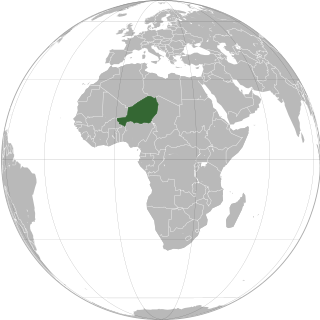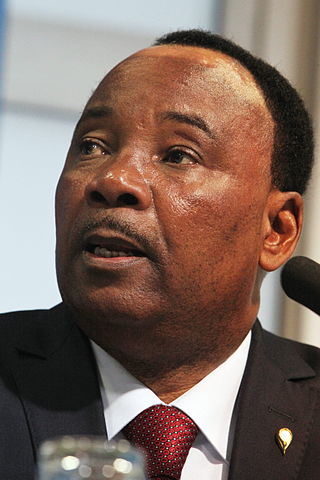
Niger, officially the Republic of the Niger, is a landlocked country in West Africa. It is a unitary state bordered by Libya to the northeast, Chad to the east, Nigeria to the south, Benin and Burkina Faso to the southwest, Mali to the west, and Algeria to the northwest. It covers a land area of almost 1,270,000 km2 (490,000 sq mi), making it the largest landlocked country in West Africa and the second largest landlocked nation in Africa behind Chad. Over 80% of its land area lies in the Sahara. Its predominantly Muslim population of about 25 million lives mostly in clusters in the south and west of the country. The capital Niamey is located in Niger's southwest corner along the namesake Niger River.
Humans have inhabited present-day Niger since prehistoric times, with evidence of early activity dating back 60,000 years. The region hosted ancient rock carvings and pastoral communities from 7,000 BCE. Once fertile, it supported large settlements and cattle herding until the climate became arid around 2500 BCE.

Politics of Niger takes place in a framework of a semi-presidential representative democratic republic, whereby the President of Niger is head of state and the Prime Minister of Niger head of government, and of a multi-party system. Executive power is exercised by the government. Legislative power is vested in both the government and the National Assembly.

General Ibrahim Baré Maïnassara was a Nigerien military officer and diplomat who ruled Niger from 1996 until his assassination. He seized and lost power in military coups.

Mamadou Tandja was a Nigerien politician who was President of Niger from 1999 to 2010. He was President of the National Movement for the Development of Society (MNSD) from 1991 to 1999 and unsuccessfully ran as the MNSD's presidential candidate in 1993 and 1996 before being elected to his first term in 1999. While serving as President of Niger, he was also Chairman of the Economic Community of West African States from 2005 to 2007.

Mahamane Ousmane is a Nigerien politician. Elected as the fourth President of Niger at 43 years old, he is the youngest elected president in Africa. He was also the first democratically elected president of his country, serving from 16 April 1993 until he was deposed in a military coup d'état on 27 January 1996. He has continued to run for president in each election since his ouster, and he was president of the National Assembly from December 1999 to May 2009. Since April 2020, he is the president of the Democratic and Republican Renewal, a major political party that is currently in opposition. RDR Tchanji formed an alliance with Ousmane's other political vehicle, MNRD Hankuri, on 16 December 2018.

Elections in Niger take place within the framework of a semi-presidential system. The President and National Assembly are elected by the public, with elections organised by the Independent National Electoral Commission (CENI).

Mahamadou Issoufou is a Nigerien politician who served as the president of Niger from 7 April 2011 to 2 April 2021. Issoufou was the prime minister of Niger from 1993 to 1994, president of the National Assembly from 1995 to 1996, and a candidate in each presidential election from 1993 to 2016. He led the Nigerien Party for Democracy and Socialism (PNDS-Tarayya), a social democratic party, from its foundation in 1990 until his election as president in 2011. During the presidency of Mamadou Tandja (1999–2010), Issoufou was the main opposition leader.

The unicameral National Assembly is Niger's legislative body. The National Assembly proposed laws and was required to approve all legislation.
Hamid Algabid is a Nigerien politician and the President of the Rally for Democracy and Progress (RDP-Jama'a) party. A lawyer, banker, and technocrat, Algabid was an important figure in the regime of Seyni Kountché, serving as Prime Minister of Niger from 1983 to 1988. He was Secretary-General of the Organisation of the Islamic Conference (OIC) from 1989 to 1996, and since 1997 he has been President of the RDP-Jama'a. He was also President of the High Council of Territorial Collectivities (HCCT) until 2010.

Mohamed Bazoum is a Nigerien politician who served as the 10th president of Niger from 2021 to 2023. He assumed office in April 2021 after winning the 2020–21 presidential election and surviving a coup d'état attempt. He was ousted in the 2023 Nigerien coup d'état by members of the presidential guard and the armed forces led by Abdourahamane Tchiani.

General elections were held in Niger in 1999; the first-round of the presidential elections was held on 17 October, with a run-off held alongside National Assembly elections on 24 November. The elections followed a coup d'état on 9 April, in which Ibrahim Baré Maïnassara, who had led an earlier coup in January 1996 and won disputed presidential elections, was assassinated. Coup leader Daouda Mallam Wanké initiated a transitional period that concluded with the victory of Mamadou Tandja, the candidate of the National Movement for the Society of Development (MNSD), over Mahamadou Issoufou, the candidate of the Nigerien Party for Democracy and Socialism (PNDS), in the run-off. The vote for the first National Assembly of the Fifth Republic, which had originally been scheduled for October, but delayed in August, also saw a victory for the MNSD, which won 38 of the 83 seats. It formed a coalition with the Democratic and Social Convention in order to gain a majority in the Assembly.

Hassoumi Massaoudou is a Nigerien politician who served as minister of Foreign Affairs of Niger from 2021 to 2023 and as minister of Finance from October 2016 to January 2019. A leading member of the Nigerien Party for Democracy and Socialism (PNDS-Tarayya), he was minister of Communication, Culture, Youth and Sports from 1993 to 1994, president of the PNDS Parliamentary Group from 1999 to 2004, director of the Cabinet of the President from 2011 to 2013, minister of the Interior from 2013 to 2016, and minister of National Defense in 2016.

The Republic of Niger has had seven constitutions, two substantial constitutional revisions, and two periods of rule by decree since its independence from French colonial rule in 1960. The "Seventh Republic" operated under the Constitution of 2010 until its dissolution in 2023 by General Abdourahamane Tchiani in a coup d'état.

The 2009–2010 Nigerien constitutional crisis occurred in Niger due to a political conflict between President Mamadou Tandja and judicial and legislative bodies regarding the Constitutional referendum that opponents claimed was an attempt to extend his mandate beyond the constitutional maximum. It was held on 4 August 2009 before a parliamentary election which was mandated to take place by 26 August 2009. The crisis eventually led to a coup d'état by military leaders who overthrew President Tandja and formed a ruling junta.
A coup d'état occurred in Niger on 18 February 2010. Soldiers attacked the presidential palace in Niamey under weapons fire at midday and captured President Mamadou Tandja, who was chairing a government meeting at the time. Later in the day, the rebels announced on television the formation of the Supreme Council for the Restoration of Democracy (CSRD), headed by chef d'escadron Salou Djibo.

The Supreme Council for the Restoration of Democracy, led by Salou Djibo, was a military junta that staged a coup in Niger on 18 February 2010, deposing President Mamadou Tandja in response to Tandja's attempts to remain in office after his term was over. The CSRD stated that its objective is to make Niger an example of "democracy and good governance."
The 1999 Nigerien coup d'état occurred on 9 April 1999 and resulted in the death of President Ibrahim Baré Maïnassara and the installation of Daouda Malam Wanké as President on 11 April. Maïnassara was shot under unclear circumstances in an ambush at either Diori Hamani International Airport, potentially while attempting to flee the country, or at a military base, likely by members of the Presidential Guard.

A constitutional referendum was held in Niger on 18 July 1999. The new constitution would restore multi-party democracy after the military coup earlier in the year had ousted elected President Ibrahim Baré Maïnassara.
Events in Niger in 2010 include:









